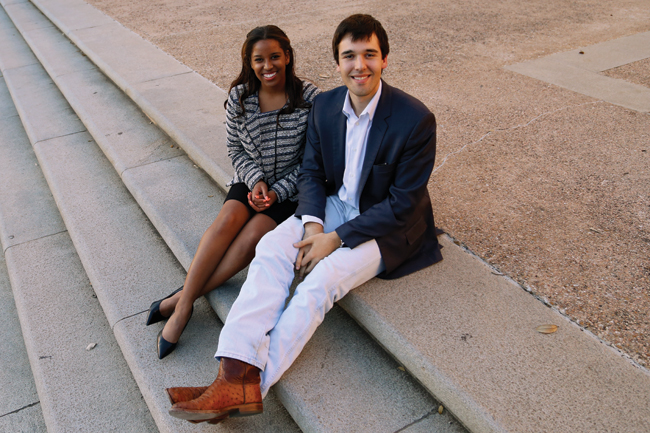Editor’s Note: With new Student Government President and Vice President Xavier Rotnofsky and Rohit Mandalapu being sworn in Tuesday evening, we thought we would take one last look at the accomplishments and failures of the outgoing administration of Kori Rady and Taylor Strickland.
One year ago, the Executive Alliance team of Kori Rady and Taylor Strickland, after winning their election by a hair, came into office with big hopes toward the future. They unveiled an ambitious platform to help the average University student in a variety of ways. This included promises of a more inclusive Student Government, but it also included more specific planks. When it comes to these specific promises, the Rady/Strickland administration has a mixed record in living up to their word.
For example, the Flawn Academic Center has now extended its hours to be a 24-hour space for students to study or use for other purposes. This comes on the heels of a broader promise by Rady/Strickland to extend hours in student buildings. Certainly, they — and the rest of Student Government — are to be commended for this achievement. However, it is important to note that momentum on this issue was also generated by external sources, such as a Firing Line in the Texan.
The pair have also had success in expanding the Safe Ride program that prevents drunk driving by transporting students from downtown bars to their homes in West Campus or Riverside.
On other issues, progress will be slower as initiatives churn through the University administration. For instance, Rady and Strickland promised an extended Thanksgiving Break, which was endorsed last semester by the Faculty Council and will likely take effect in two years.
But elsewhere, progress has been almost nonexisten. Namely, during the campaign, the ticket promised to “lobby for student IDs meeting voter requirements.” Literally, the administration has done this, as the Texan reported time and again last semester. However, these exercises in lobbying don’t seem to have been particularly successful. Anyone can try and fail at a task at hand, but the students expect leaders who can actually deliver results.
Be it alcohol at football games, forgiveness for first-time parking offenders or more kosher and halal eating options for students on campus, there are a number of other issues that we can find almost no progress on since Rady/Strickland took office.
Obviously, it would be the height of naivete to completely fault Rady/Strickland for not being able to wave a magic wand and completely enact their admittedly sometimes far-fetched agenda. However, if an idea was not realistic to begin with, candidates have no business wooing prospective voters with its fantastic siren songs.
Furthermore, much of the platform arguably was stymied by a dysfunctional and sometimes broken Student Government Assembly. Petty internal dramas ate up a considerable amount of valuable legislative time this academic year, leaving far less time for deliberating and debating pertinent issues. Additionally, even when the Assembly resigned itself from superficial squabbles and actually did its job, it was often unwilling to prioritize the big-picture issues with which Executive Alliance candidates’ platforms are replete. Alternatively, the Assembly sometimes valued insignificant and sometimes downright extraneous issues, such as recently wading into foreign policy.
Serving at the helm of this University’s Student Government is not an easy task. Indeed, both recurring constraints and new challenges beset leaders year after year. Rady and Strickland have faced particularly tough constraints and still managed to accomplish plenty, but they could have done more.
Hopefully, Xavier Rotnofsky and Rohit Mandalapu, who will be sworn in as Student Government president and vice president, respectively, Tuesday evening, will be able to learn from their mistakes, but also double down on the countless positive steps that the old leaders were able to fortunately take during their year in office.
















